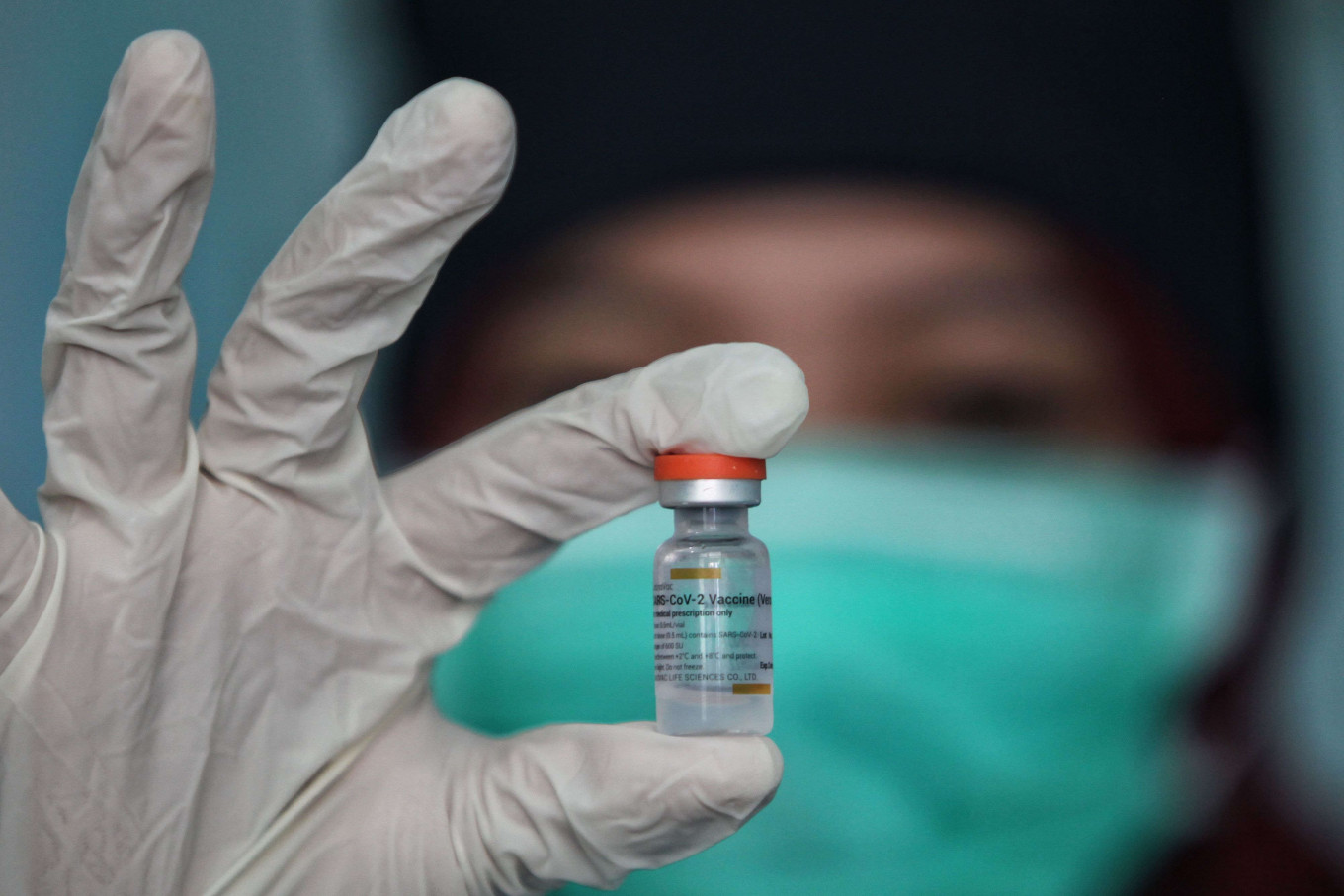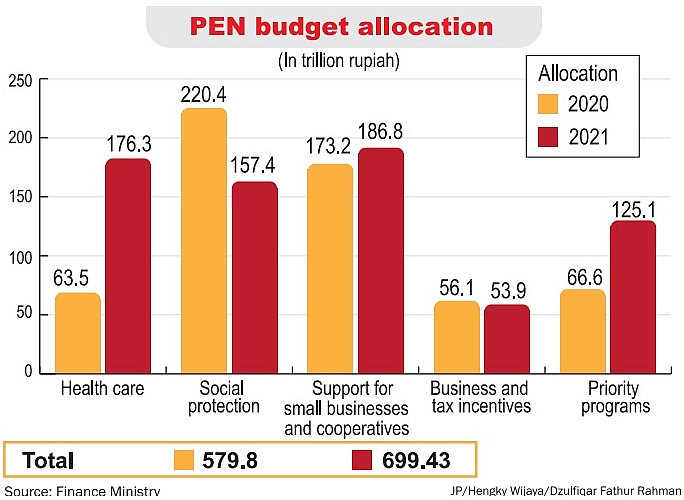Popular Reads
Top Results
Can't find what you're looking for?
View all search resultsPopular Reads
Top Results
Can't find what you're looking for?
View all search resultsGovernment pledges higher spending boost to focus on health
Nearly a year into battling the COVID-19 crisis, the government has switched its focus to pouring more funds into public health and social protection with a 20.6 percent hike to the 2021 PEN budget.
Change text size
Gift Premium Articles
to Anyone
T
he government has pledged to boost spending to drive the recession-hit economy, including by increasing the COVID-19 emergency fund to bring the raging health crisis under control.
Government spending was up 4.2 percent year-on-year (yoy) in January 2021 to Rp 145.8 trillion (US$10.5 billion), driven in part by spending on social protection and infrastructure, according to Finance Ministry data. The government is planning to increase spending 6.2 percent this year to Rp 2.75 quadrillion from Rp 2.58 quadrillion last year.
Finance Minister Sri Mulyani Indrawati on Tuesday told a virtual press conference that the government had also raised the 2021 national economic recovery (PEN) fund to Rp 699.43 trillion, up 20.6 percent from last year’s actualized budget, and 73.1 percent higher than the Rp 403.9 trillion initially earmarked for the program in early January.
The PEN budget hike includes a nearly threefold increase to the healthcare stimulus fund to Rp 176.3 trillion to support the country’s COVID-19 response, including the mass inoculation program. The healthcare stimulus fund, which saw the single largest budget increase, also has the second largest budget allocation among all PEN program sectors.
“If we look at 2021, the [PEN financing] design has been modified,” Sri Mulyani told reporters.
She explained that the government had dramatically increased the healthcare stimulus fund because the public health sector had commenced the “three Ts” (test, trace, treat) and inoculation programs nationwide.
National economic recovery budget allocation (JP/Hengky Wijaya/Dzulfiqar Fathur Rahman)The spending boost aims to accelerate the COVID-19 inoculation program to achieve its 67.2 percent coverage target, or 181.55 million Indonesians, by March 2022, as well as to recover the lagging economy.
The economy contracted 2.19 percent yoy in the fourth quarter of 2020 with negative growth in nearly all components, including household consumption, but it was less severe than the 5.32 percent and 3.49 percent contractions recorded respectively in the second and third quarters.
Government spending is the only component that saw positive growth in 2020 with 1.94 percent, while the economy saw negative growth of 2.07 percent on an annual basis.
Meanwhile, to offset the healthcare stimulus hike, the government has started phasing out the social protection fund to Rp 157.4 trillion, down 28.6 percent from last year’s actualized budget. Social protection received the highest allocation in the 2020 PEN budget.
Sri Mulyani said the government expected economic activities to pick up in the first quarter with the new stimulus budget, particularly for the PEN program, given the third-quarter impacts of total spending last year in countering the pandemic-induced recession.
“The impact was seen in the third quarter, when we [saw] an immediate rebound or a turning point from the worsening economy. This continued in the fourth quarter,” said Sri Mulyani.
Read also: Get vaccinated or lose your social aid, Indonesian government says
With the government increasing spending to keep the economy afloat, the budget deficit widened to Rp 45.7 trillion in January, or 0.26 percent of gross domestic product (GDP). This marked a slight increase of 0.03 percentage points from January 2020.
The government estimates a budget deficit of 5.7 percent of GDP this year, lower than last year’s figure of 6.09 percent.
The widening deficit corresponds with the 4.8 percent yoy decline in state revenue to Rp 100.1 trillion in January, when the government collected just Rp 68.5 trillion in tax revenue, down 15.3 percent yoy.
The government disbursed 83 percent of the 2020 PEN budget, or Rp 695.2 trillion, and plans to use the remaining Rp 50.94 trillion to finance the inoculation program and stimulus package for small businesses and cooperatives.
It is also planning to raise more loans to finance this year’s state budget, after recording loan growth of 143 percent yoy to Rp 165.8 trillion in January.
Bank Indonesia (BI) data showed external debt was up 3.5 percent yoy to $417.5 billion in the fourth quarter of 2020, when government debt increased 3.3 percent annually to $206.4 billion. This was more than twice the 1.6 percent growth recorded in the third quarter, supported by foreign capital inflows to the sovereign bond market, with the government borrowing mostly going to public health and social protection.
Read also: Indonesian economy remains under stress as cases continue to climb
The total external debt brought Indonesia’s debt-to-GDP ratio to 39.4 percent in the fourth quarter of 2020 from 38.1 percent in the previous quarter, which the central bank still deemed as “healthy” in an official statement.
“For the past 10 years, we managed to maintain the [debt-to-GDP] ratio below 30 percent, except in 2020 because of COVID-19,” Yustinus Prastowo, special staffer to the Finance Minister, told a virtual discussion on Tuesday. “Indeed, there is relaxation, but we are keeping an eye on that.”
Separately, Bank Permata economist Josua Pardede told The Jakarta Post in a phone interview on Tuesday that the PEN budget hike was not expected to further pressure the budget deficit. Some sectors were expected to recover this year, which narrowed the possibility of a similar shortfall in tax revenue.
“We expect the deficit to stand within the 5 to 5.7 percent range. I think the potential is smaller for the deficit to widen to beyond 6 percent again,” Josua said.
Also on Tuesday, economist Piter Abdullah at the Center for Reform on Economics (CORE) Indonesia told the Post via text message that he welcomed the government’s emphasis on the healthcare stimulus, as vaccine procurement and distribution could speed up economic recovery.
“The government’s focus is better now, which is on the pandemic [response],” said Piter, noting that the government had also improved “disbursements to affected people and businesses so they can survive during the pandemic”.
Around 1.26 million Indonesians had received their first vaccine jab as of Tuesday, even as a daily spike of 9,775 new cases brought the nation’s COVID-19 tally to just under 1.3 million cases.











